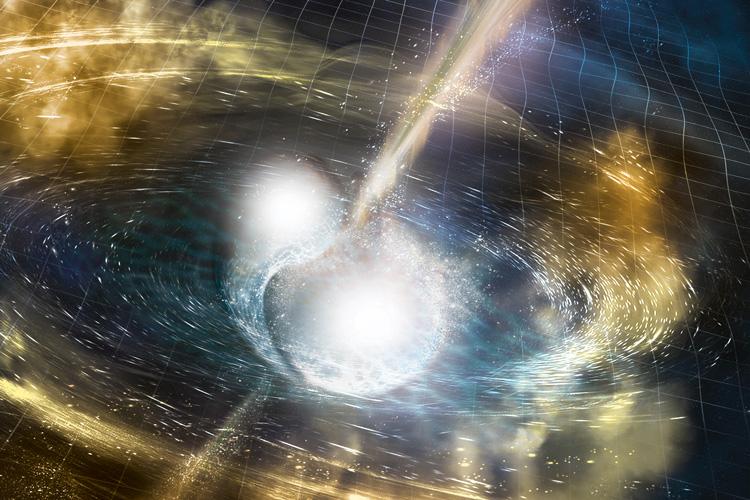-
Stellar explosion in 1054 C.E. may have been a third flavor of supernova
June 29, 2021
A team of astronomers including UC Berkeley professor Alex Filippenko have found convincing evidence that supernovae come in a third flavor, powered by a long-suspected explosive mechanism that may explain a bright supernova humans observed 1,000 ago and that birthed the beautiful Crab Nebula. The evidence is an exploding star observed in 2018, the first that fits all six criteria for a hypothesized type of supernova called an electron-capture supernova. Read more...
More -
Professor Dressing Wins Pierce Prize
April 15, 2021
Professor Courtney Dressing has been awarded the 2021 Newton Lacy Pierce Prize for outstanding achievement in Astronomy "for her leading contributions that have dramatically advanced our understanding of the formation rate, composition, and evolution of planets around low-mass M dwarf stars." Congratulations! Read More...
More -
How fast is the universe expanding? Galaxies provide one answer.
March 9, 2021
Determining how rapidly the universe is expanding is key to understanding our cosmic fate, but with more precise data has come a conundrum: Estimates based on measurements within our local universe don’t agree with extrapolations from the era shortly after the Big Bang 13.8 billion years ago. A new estimate of the local expansion rate — the Hubble constant, or H0 (H-naught) — reinforces that discrepancy. “For measuring distances to galaxies out to 100 megaparsecs, this is a fantastic method,” said cosmologist Chung-Pei Ma, the Judy Chandler Webb Professor in the Physical Sciences at the University of California, Berkeley, and…
More -
UC Berkeley Astronomer to appear on Jeopardy! this week
February 22, 2021
UC Berkeley Astronomer Ken Shen will be appearing on Jeopardy! on Wednesday, February 24, 2021. On the experience of his competing in the famous television show, Shen writes: “My greatest fear was that an astronomy or physics clue would show up and I'd flub it. Luckily, I don't think that happened, but honestly, everything was a blur. If you'd like to know some more about the process and what filming is like, I'll be posting threads on Twitter for the next few days. The first one is here: https://twitter.com/kenjshen/status/1362842364826423298”
More -
Active volcanoes feed Io’s sulfurous atmosphere
October 21, 2020
The atmosphere on Jupiter’s moon Io is a witches’ brew, composed primarily of the sulfurous exhalations of more than 400 volcanoes that dot the surface. Until now, however, it has been unclear whether volcanoes spewing hot sulfur dioxide (SO2) are the main contributors to the atmosphere, or whether the main component is the accumulated cold SO2,much of which is frozen on the surface, but in sunlight evaporates or sublimates into the atmosphere. New observations with the Atacama Large Millimeter/submillimeter Array (ALMA) in Chile, led by astronomer Imke de Pater of the University of California, Berkeley, partially resolve that question. Read…
More -
Congratulatory Ceremony for Reinhard Genzel
October 7, 2020
Please enjoy this edited video recording of the online congratulation of Nobel Prize winner Reinhard Genzel by UC Berkeley. https://www.youtube.com/watch?v=iltUStT9f2A
More -
UC Berkeley played big role in Nobel Prize-winning work
October 7, 2020
Huge leaps in technology allowed Reinhard Genzel to probe stars zipping around the center of the Milky Way galaxy 25,000 light years away, eventually earning him a portion of the 2020 Nobel Prize in Physics. But later in the day, Zoom technology proved too balky to bridge the gap between the physicist, currently in Munich, and his fans in Berkeley. Genzel, a Berkeley professor emeritus of physics and astronomy, as well as director of the Max Planck Institute for Extraterrestrial Physics in Germany, credited the late Berkeley Nobel laureate Charles Townes for initiating the studies that led to the discovery. Decades…
More -
UC Berkeley’s Reinhard Genzel awarded Nobel Prize in Physics
October 6, 2020
Reinhard Genzel, a professor emeritus of physics and of astronomy at the University of California, Berkeley, and director of the Max Planck Institute for Extraterrestrial Physics in Garching, Germany, will share half the 2020 Nobel Prize in Physics with UCLA professor Andrea Ghez “for the discovery of a supermassive compact object at the center of our galaxy.” Read More
More -
Stuart Bowyer, pioneer of EUV astronomy and SETI, dies at 86
October 5, 2020
Stuart Bowyer, an astronomer who convinced NASA to launch the first satellite to study the heavens in extreme ultraviolet wavelengths and started one of the longest running searches for extraterrestrial intelligence (SETI) in the world, died Sept. 23 at a hospital near his home in Orinda, California. His family said the cause was complications associated with COVID-19. Bowyer, a professor emeritus of astronomy at the University of California, Berkeley, was 86. Read more
More -
New center to focus on physics of ultra-dense neutron stars
August 20, 2020
The National Science Foundation (NSF) has awarded UC Berkeley $10.9 million over five years to expand research on the exotic state of matter inside neutron stars — the dense remains of exploded stars — and what can be learned from the growing number of gravitational wave detectors now listening for the spacetime vibrations generated by the violent merger of two neutron stars. The Network for Neutrinos, Nuclear Astrophysics and Symmetries (N3AS) is an NSF Physics Frontier Center led by Wick Haxton, Berkeley professor of physics and a theoretical nuclear physicist at Lawrence Berkeley National Laboratory (Berkeley Lab). The N2AS center,…
More









